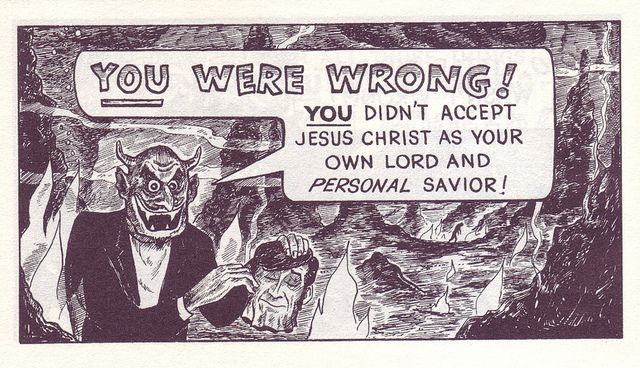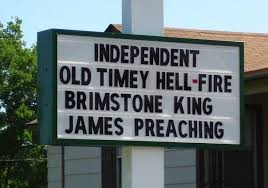- Jul 2, 2018
- 18,580
- 11,393
- Country
- United States
- Gender
- Male
- Faith
- Christian
- Marital Status
- Married
From a CWR (Christianity Without Religion) article by Brad Jersak titled:
What if you’re wrong about hell?
(Source link: Q&R with Brad Jersak: What if you're wrong about hell?)
Note this is more to read at the link than what I have posted in the OP here.
Comments and discussion welcome.
Q&R with Brad Jersak: What if you’re wrong about hell?
~~~~~~~~~~~~~~~~~~~~~~~~~~~~~~~~~~~~~~~~~~~~
Question:
Recently, in response to my rejection of the hell of eternal torment, one of my readers offered a fairly common objection: “I hope you’re right about that. BUT if you’re wrong about hell, then a lot of people will go there … and it will be your fault. Wouldn’t it be better to play it safe just to be sure?”
The following response was adapted from a much longer essay from Clarion Journal, titled, “Let’s Talk about Hell BETTER or “If You’re Wrong, a Lot of People Will Go to Hell & It’s Your Fault” by Brad Jersak.
Response: The Wager
This high stakes objection is worthy of a careful response.
Here’s the troubling news: preaching eternal hellfire no longer scares people into Jesus arms. Statistically, it creates atheists by the millions. If you’re truly worried about people going to hell, then you had better NOT mention it, because such preaching is among the top stated reasons why people now reject Christ.
This is a fact in the 21st century: people today reject the good news of Jesus Christ when we import hellfire preaching into our gospel. They do this because:
What if you’re wrong about hell?
(Source link: Q&R with Brad Jersak: What if you're wrong about hell?)
Note this is more to read at the link than what I have posted in the OP here.
Comments and discussion welcome.
Q&R with Brad Jersak: What if you’re wrong about hell?
~~~~~~~~~~~~~~~~~~~~~~~~~~~~~~~~~~~~~~~~~~~~
Question:
Recently, in response to my rejection of the hell of eternal torment, one of my readers offered a fairly common objection: “I hope you’re right about that. BUT if you’re wrong about hell, then a lot of people will go there … and it will be your fault. Wouldn’t it be better to play it safe just to be sure?”
The following response was adapted from a much longer essay from Clarion Journal, titled, “Let’s Talk about Hell BETTER or “If You’re Wrong, a Lot of People Will Go to Hell & It’s Your Fault” by Brad Jersak.
Response: The Wager
This high stakes objection is worthy of a careful response.
- “Wrong about hell” in what way? The implication seems to imply that I don’t believe there’s a hell or that the hell I believe in is not something to worry about. Not so! Of course I believe in hell. I’ve been there. I’ve seen it with my eyes, in my spirit and in my Bible. And now I preach the good news, knowing that Christ conquered hades (Rev. 1:18) to rescue us and he came back victorious with a host of captives (Mark 3:27, Eph. 4:8). I see no reason to believe that my conviction that hell is horrendous but not eternal would endanger a single soul of going there.
- Are we saved by belief in Christ or by belief in hell? I assume that objectors believe that the material cause of our salvation is Jesus Christ and the efficient cause is faith in his name. Nowhere do the Scriptures demand belief in a particular doctrine of hell as a requirement for saving faith. No doctrine of hell entered New Testament evangelism or our confession of faith at baptism. One can check every evangelistic sermon in Acts to verify this.
- The ‘Safe’ Wager: The charge seems to be rooted in a fear-based wager that ultimately bites itself in the behind. The wager goes like this: IF eternal conscious torment is even a possibility, then we’d better warn people about it or they will end up there. Makes sense, right? Well… that might have worked in Jonathan Edwards time. I say might because can we be so sure that those who repent out of fear of being roasted alive forever actually responded in willing faith to Jesus Christ? Did they love him because they’d God’s love in the revelation of the Cross? Or did Edwards merely convince them to convert with the eternal conscious gun to their heads? Is that saving faith?
Here’s the troubling news: preaching eternal hellfire no longer scares people into Jesus arms. Statistically, it creates atheists by the millions. If you’re truly worried about people going to hell, then you had better NOT mention it, because such preaching is among the top stated reasons why people now reject Christ.
This is a fact in the 21st century: people today reject the good news of Jesus Christ when we import hellfire preaching into our gospel. They do this because:
- It sounds more like medieval mythology than gospel truth. It doesn’t resonate at all.
- It looks more like a B-grade horror movie than something anchored to reality.
- It sabotages the evangelist’s credibility because it doesn’t sound like the foolishness of the gospel (Christ and him crucified). It sounds more like the silliness of radical fundamentalism.
- It enables the listener to defer judgment to an imagined “later” rather than facing all the ways they are already perishing and in bondage to the kingdom of hell today.




